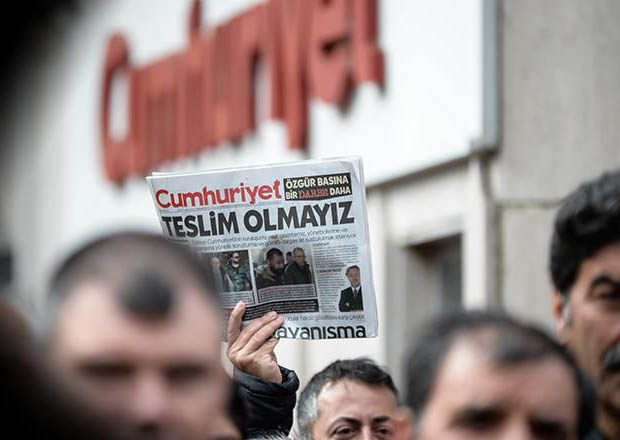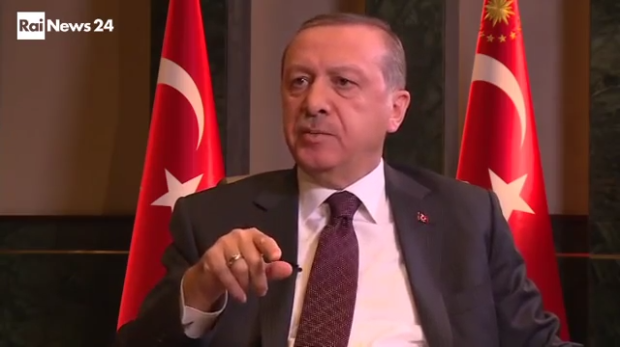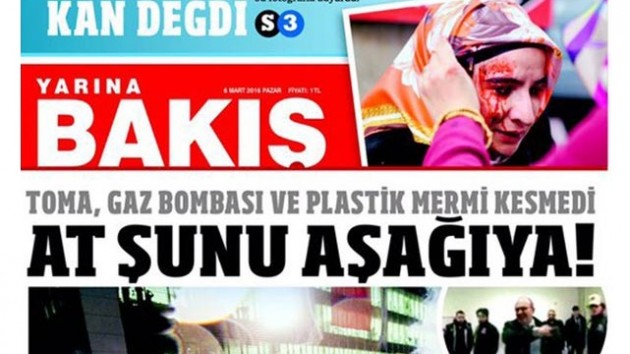2 Nov 2016 | Campaigns, Campaigns -- Featured, Europe and Central Asia, Statements, Turkey, Turkey Letters

A coalition of 14 leading international press freedom and freedom of expression organisations today condemned as an “extraordinary attack on press freedom” the jailing of top journalists with Turkey’s Cumhuriyet newspaper and the closure of 15 pro-Kurdish media in a letter to leading Turkish officials.
On Monday, October 31, Turkish authorities launched a mass operation against Cumhuriyet, a secular daily considered one of the last opposition media voices in Turkey. Police arrested nearly a dozen journalists, managers and lawyers, including Editor-in-Chief Murat Sabuncu and columnist Kadri Gürsel, a member of the International Press Institute’s global Executive Board.
The coalition said today it was “deeply disturbed” by the attack both against “a highly respected newspaper that remains one of Turkey’s last sources of critical news and information and a representative of a major international human rights organisation”.
The operation against Cumhuriyet followed the closure of 15 pro-Kurdish media outlets on Saturday, which the coalition described as a “further attempt by the Turkish government to control all media coverage of the ongoing operations [in the country’s South East], and prevent independent media from investigating grave human rights abuses there”.
Members of the coalition called on Turkey to immediately release the detained Cumhuriyet journalists, as well as the estimated more than 130 other journalists currently behind bars “for exercising their right to freedom of expression” in the country.
In copies of the letter addressed to Turkish President Recep Tayyip Erdoğan, Prime Minister Binali Yıldırım, Foreign Minister Mevlut Cavusoglu and Justice Minister Bekir Bozdag, the group made an urgent request to discuss its concerns in person.
Read the text of the letters below in English and Turkish. The letter can also be downloaded as a PDF in English and Turkish.
President Recep Tayyip Erdoğan
Cumhurbaşkanlığı Külliyesi 06560 Beştepe-Ankara
Sent via email
02 November 2016
Dear President Erdoğan:
The undersigned members of an international coalition of leading press freedom and freedom of expression groups request an urgent meeting with you following Monday’s operation against the newspaper Cumhuriyet and Saturday’s closure of 15 pro-Kurdish media outlets.
Police on Monday arrested and raided the homes of at least a dozen journalists working for Cumhuriyet. Among those arrested were Editor-in-Chief Murat Sabuncu and columnist Kadri Gürsel. Mr. Gürsel is also a member of the Executive Board of the International Press Institute (IPI) and IPI’s official representative in Turkey.
We are deeply disturbed by this move against not only a highly respected newspaper that remains one of Turkey’s last sources of critical news and information but also a representative of a major international human rights organisation.We are also extremely concerned that those detained are being held without access to legal counsel and without a clear indictment against them.
The closure of 15 pro-Kurdish media outlets, primarily covering the South East of the country, is part of an ongoing campaign to censor the Kurdish minority. It also represents a further attempt by the Turkish government to control all media coverage of the ongoing anti-terror operations in this region, and prevent independent media from investigating grave human rights abuses occurring there.
We condemn these arrests and closures as an extraordinary attack on press freedom, freedom of expression and the journalistic profession – unfortunately merely the latest example of such in Turkey. Our organisations stand in solidarity with Mr. Sabuncu, Mr. Gürsel and their colleagues, as do journalists around the world.
Prosecutors have said that Mr. Sabuncu, Mr. Gürsel and their colleagues are suspected of criminal collaboration with the outlawed Gülenist movement and the PKK. While we understand the need to take appropriate action against those responsible for July’s failed coup attempt, the arrests of Cumhuriyet staff and the sweeping closures of Kurdish media make it clear that Turkey’s current state of emergency is being abused to indiscriminately target any and all who criticise the government.
Indeed, during the first three months of the state of emergency, the Turkish authorities have closed approximately 165 media outlets. Nearly 100 journalists and writers have been arrested and at least 140 journalists are currently in detention, many of whom have no connection to either the Gülenist movement or the PKK.
We would welcome the opportunity to bring our concerns to you directly.
In the meantime, this coalition calls for the immediate release of Murat Sabuncu, Kadri Gürsel, their colleagues at Cumhuriyet and all other journalists jailed for exercising their right to freedom of expression. We also call on lawmakers in Turkey to end the abuse of emergency powers that are being used to suppress legitimate dissent, further crackdown on independent media and undermine what is left of the rule of law.
Thank you for your attention to this urgent matter.
The International Press Institute (IPI)
The Committee to Protect Journalists (CPJ)
Reporters Without Borders (RSF)
The International Federation of Journalists (IFJ)
The European Federation of Journalists (EFJ)
Article 19
Index on Censorship
The Ethical Journalism Network (EJN)
PEN International
The World Association of Newspapers and News Publishers (WAN-IFRA)
The South East Europe Media Organisation (SEEMO)
IFEX
Association of European Journalists (AEJ)
European Centre for Press and Media Freedom (ECPMF)
CC: Prime Minister Binali Yıldırım
Foreign Minister Mevlut Cavusoglu
Justice Minister Bekir Bozdag
Foreign embassies and consulates in Ankara and Istanbul
Sayın Cumhurbaşkanı,
Dünyanın önde gelen basın ve ifade özgürlüğü örgütlerinden oluşan uluslararası koalisyonun altta imzası bulunan üyeleri olarak, Cumhuriyet Gazetesi’ne yapılan operasyonun ve Kürtlere yönelik yayınlarıyla bilinen 15 medya kuruluşunun kapatılmasının ardından, acil toplantı talebimizi iletmek üzere bu mektubu yazıyoruz.
Polis, Cumhuriyet Gazetesi’nde çalışan en az bir düzine gazeteciyi, pazartesi günü evlerine baskın düzenleyerek gözaltına almıştır. Gözaltına alınanlar arasında, IPI’ın Yönetim Kurulu Üyesi ve Türkiye’deki resmi temsilcisi Sayın Kadri Gürsel ile IPI üyesi olan Cumhuriyet Genel Yayın Yönetmeni Murat Sabuncu da vardır.
Türkiye’de eleştirel haber ve yorumların yer alabildiği az sayıda kaynaktan biri olan Cumhuriyet’e yönelmekle birlikte, aynı zamanda önde gelen bir uluslararası insan hakları örgütünün temsilcisini de hedef alan bu hamle, bizde derin bir rahatsızlık yaratmıştır.
Özellikle de ülkenin güneydoğusundan haberler veren 15 medya kuruluşunun kapatılması, Kürt azınlığın sansürlenmesi için sürdürülen kampanyanın bir parçasıdır. Bu karar, Türk hükümetinin, bölgede süren terörle mücadele operasyonlarının haberleştirilmesinde tüm medyayı kontrol altına almak yönündeki çabasında yeni bir adımı temsil ediyor.
Bu gözaltı ve kapatma kararlarını, basın ve ifade özgürlüğü ile gazetecilik mesleğine yönelik olağanüstü bir taarruz olarak görüp kınıyoruz –ki bu durum ne yazık ki Türkiye için bir ilk değildir. Dünyanın dört bir yanındaki gazetecileri temsil eden örgütlerimiz, Sayın Gürsel, Sayın Sabuncu ve diğer meslektaşlarımızın yanındadır.
Savcılar, Sayın Gürsel ve Sabuncu’nun yasadışı örgütler olan Gülen hareketi ve PKK ile suç teşkil eden bir işbirliğinde olduğundan şüphelendiklerini söylüyorlar. 15 Temmuz darbe girişiminden sorumlu olanlara karşı uygun bir eylemin yapılması gerektiğine inanmakla birlikte, Cumhuriyet çalışanlarına yönelik gözaltılarla Kürtlere yönelik yayın yapan medya kuruluşlarının kapatılmasının bu kapsama girdiğini düşünmüyoruz. Bu gözaltılar, daha ziyade, Türkiye’deki mevcut OHAL yönetiminin, hükümeti eleştirmeye cüret eden herkese karşı ayrım gözetmeksizin kullanıldığını gösteriyor.
Gerçekten de, OHAL’in ilk üç ayı içinde Türk yetkililer yaklaşık 165 medya kuruluşunu kapatmış, 100 kadar gazeteci ve yazarı tutuklamış, birçoğu Gülen hareketi veya PKK ile hiçbir bağlantısı olmadığı halde en az 140 gazeteciyi gözaltına almıştır.
Endişelerimizi zât-ı âlilerinize doğrudan iletme fırsatını bulursak çok memnun oluruz.
Bu arada, uluslararası basın özgürlüğü koalisyonu olarak Sayın Gürsel, Sayın Sabuncu ve Cumhuriyet’teki diğer meslektaşlarımızla, ifade özgürlüğü hakkını kullandıkları için hapsedilen tüm gazetecilerin derhal salıverilmesi yönünde çağrı yapıyoruz. Türkiye’deki kanun yapıcıları, OHAL yetkilerini meşru muhalefeti susturmaya, özgür medyaya daha fazla baskı yapmaya ve tüm bunlardan arda kaldığı kadarıyla hukuk devletinin altını oymaya son vermeye davet ediyoruz.
Bu acil konudaki dikkatiniz için teşekkür ederiz.
Saygılarımızla,
The International Press Institute (IPI)
The Committee to Protect Journalists (CPJ)
Reporters Without Borders (RSF)
The International Federation of Journalists (IFJ)
The European Federation of Journalists (EFJ)
Article 19
Index on Censorship
The Ethical Journalism Network (EJN)
PEN International
The World Association of Newspapers and News Publishers (WAN-IFRA)
The South East Europe Media Organisation (SEEMO)
IFEX
Association of European Journalists (AEJ)
The European Centre for Press and Media Freedom (ECPMF)
31 Oct 2016 | Campaigns, Campaigns -- Featured, Statements, Turkey, Turkey Statements
Index on Censorship strongly condemns the recent wave of arrests and forced closures of media outlets in Turkey.
Over the last three days, Turkish authorities have utilised their powers under the state of emergency to shut down 15 pro-Kurdish media outlets and detain 13 journalists.
“The Turkish government’s latest attempt to silence journalists is confirming the ongoing crackdown on media freedom and throws light on the deteriorating environment for free speech in the country. Media outlets covering the Kurdish minority have been repeatedly targeted and these decrees indicate the authorities have no plans to let up the pressure,” Index’s senior advocacy officer, Melody Patry, said.
On 29 October the Turkish government adopted cabinet decrees No. 675 and 676 which ordered the shutdown of 10 pro-Kurdish newspapers, two news agencies and three magazines. The newspapers include: Özgür Gündem, Azadiya Welat, Batman Çağdaş, Cizre Postası, Güney Express, İdil Haber, Kızıltepe’nin Sesi, Prestij Haber, Urfanatik and Yüksekova Haber; The two pro-Kurdish news agencies were Dicle News Agency (DİHA) and Jin News Agency; and the three magazines shut down were Tiroji, Özgürlük Dünyası and Evrensel Kültür.
On 31 October 2016, 13 editors and journalists for independent newspaper Cumhuriyet were detained on terror charges in Istanbul. Those detained include Cumhuriyet editor-in-chief Murat Sabuncu, board executive and columnist Güray Öz, former editor-in-chief of the newspaper Aydın Engin, columnist Hikmet Çetinkaya, the editor-in-chief of the newspaper’s book supplement Turhan Günay, its publications advisor Kadri Gürsel – who is also the head of the International Press Institute’s Turkey office – and accountant Bülent Yener. Cumhuriyet Foundation’s board members Eser Sevinç, Hakan Kara, Musa Kart, Bülent Utku, Mustafa Kemal Güngör, Önder Çelik were also taken into custody.
Detention warrants were also issued for Cumhuriyet Foundation vice president Akın Atalay and board member Nebil Özgentürk, who are both currently out of the country.
Charges against the Cumhuriyet executives include publishing reports that legitimised the coup and management irregularities.
“News of journalists being arrested in Turkey have come in on a nearly daily basis since the start of the state of emergency,” said Hannah Machlin, Index’s project officer for Mapping Media Freedom. “The detentions of Cumhuriyet’s media workers constitute a blatant violation of press freedom that pushes Turkey further away from democratic values.”
Cumhuriyet has continually been harassed by the authorities. The now former editor-in-chief, Can Dundar survived a murder attempt last year and is facing a five-year prison term for “leaking state documents”. Dundar was forced to leave the country following the failed coup and his wife is currently under a travel ban.
With this most recent crackdown, the Platform for Independent Journalism P24 reports that a total of 168 media outlets have been shut down, 99 journalists have been imprisoned and over 2,500 media professionals have lost their jobs since the start of the state of emergency.
4 Aug 2016 | Europe and Central Asia, News, Turkey, Turkey Uncensored

Turkish president Recep Tayyip Erdogan interviewed on Italy’s RAI News 24
Turkey’s third post-coup week has been full of uncertainties, suspicion and concern. As of Wednesday morning there were 1,297 individuals subject to an international travel ban, among them 35 journalists and 51 lawyers.
A developing rift between Ankara and Rome illustrates what Turks can expect from the government-controlled and -aligned media: a moulding of the truth to fit the words and agenda of the country’s president.
In a combative interview with Italy’s RAI News 24, president Recep Tayyip Erdogan challenged the Italian government’s investigation of his son Bilal. He warned that the incident would put Turkey’s relations with Italy “in difficulty”.
“If my son had entered Italy, he would perhaps be arrested. What is this? My son, who is a bright man, is accused of money laundering. Instead of hassling my son, Italy should deal with its own mafia,” he said angrily.
His anger spilled over to the city of Bologna as well. “In that city they call me a dictator,” Erdogan said. “They organise pro-PKK demonstrations. Why don’t they [Italian authorities] step in? This issue will jeopardise our relations with Italy.”
Later, Italy’s prime minister, Matteo Renzi, responded on Twitter: ”In this country the judges respond to the laws and the Italian constitution, not the Turkish president. It’s called ‘rule of law.'”
It’s unnerving how this not-so-diplomatic sparring played out in the Turkish press. While Erdogan’s words were widely quoted on TV channels, the Italian prime minister’s reaction was missing. As media-monitoring organisations pointed out, half of reality was missing, self-censored by subservient outlets under the president’s thumb.
Erol Önderoğlu, Reporters Without Borders’ Turkey representative, asked via Twitter whether or not Turkish TV channels would consider reporting Renzi’s “rule of law” comments. Sadly, he knew they wouldn’t.
It goes further, though. As if self-censorship wasn’t enough, the government moved to block access to articles about the money laundering allegations against Bilal Erdogan following the RAI interview. Cumhuriyet — one of the handful of independent media outlets remaining — reported that Diken and Gazeteport — already under the eye of the government — were sites that had their coverage censored.
At the same time, behind the smokescreen of a subservient press, the Erdogan administration has turned its oppressive measures on Kurdish journalists. Police in the Karayazı District of Erzurum Province detained Mehmet Arslan, a reporter for Dicle News Agency (DİHA). Turkish telecommunications regulator, TIB, blocked access to the website of JİNHA news agency, which mainly covers Kurdish issues.
Journalists on social media were warning authorities that there was a high risk that a journalist in detention, Haşim Söylemez, who recently had two successive brain surgeries, could face health issues in jail.
A colleague of his, briefly arrested with Söylemez, tweeted that “he had a hard time even standing up in the cell”.
Önderoğlu is as deeply concerned as I am about the coming weeks. He said in next four months at least 149 journalists will be facing courts and, due to emergency rule practices, there will be many legal inquiries underway about the others, mainly based on the Anti-Terror Law and the Criminal Code.

Turkey Uncensored is an Index on Censorship project to publish a series of articles from censored Turkish writers, artists and translators.
20 Jul 2016 | Europe and Central Asia, Mapping Media Freedom, News, Turkey, Turkey Uncensored

The 6 March 2016 edition of Yarına Bakış, an independent newspaper print houses now refuse to publish
On Tuesday 19 July, Turkey’s independent and critical journalists, academics and law experts woke up to another day of concern and fear.
The uncertainty is driven by the lack of assurances on media freedom or even a basic respect for the rule of law. At a time when the country is purging its administration of alleged coup plotters, its leaders should be calming nerves and calling for transparency. On the contrary, President Reccep Tayyip Erdoğan and Prime Minister Binali Yıldırım appear to be in favour the reintroduction of the death penalty.
The media is the most fragile element in the middle of the mess.
Arzu Yıldız, a rigorously independent expert reporter on judicial affairs, was one of the first to feel the heat. An arrest order — with no reason given — was issued against her but the police who came to her flat early on Monday morning were unable to find her. She later tweeted that, since she “had nothing to fear” she would surrender to the police. So far, no further news has been heard about her.
Colleagues I spoke to share the view that by silencing such an expert reporter the authorities may be intending to erect a wall to hide what has been “really” happening — what many of us see as a massive purge within the judiciary — where more than 2,500 members (judges and prosecutors) are sought under a mass arrest order. Yıldız knows many of them, who they are and what they stand for.
Hours after the collapse of the coup attempt, a long list of journalists “to be arrested” went into circulation. Most of them are either editors or columnists — mainly liberals and leftists — who have been writing for newspapers as Özgür Düşünce, Yarına Bakış and Yeni Hayat. They have all now been smeared as affiliates of the Gülen Movement. Can Dündar, the editor of Cumhuriyet daily, is also among those targeted.
Since the day after the bloody coup attempt a media blackout has spread. More than 10 news websites have been shut down. On Monday night it was reported that several print houses refused to print Yarına Bakış and Yeni Hayat dailies, with no reason given. The editors feel that political pressure or fear lie behind them. Yarına Bakış issued an editorial online stating that it was forced to suspend its print edition, citing oppressive measures. On Tuesday, the liberal Özgür Düşünce daily, many of whose columnists found themselves to be victims of the witch hunt, announced it was also considering discontinuing its print edition. The independent website Haberdar, that was the first to break the coup attempt story, is to radically downsize, closing its newsroom and firing staff, according to inside sources.
There seems to be agreement among Turkey’s down-trodden, critical journalists and their foreign colleagues that the “dark times” will be long lasting and it may spell an end to independent journalism altogether.
Many fear a crackdown will sweep through the Turkish and Kurdish media. There are concerns over the closure of one free outlet after the other, the financial struggles these organisations face and the journalists forced into unemployment, declared as “public enemies” or “pariahs” and left without mediums to report and comment. The situation could not be any more serious.
A version of this article was originally posted to Suddeutsche Zeitung. It is published here with permission of the author.

Turkey Uncensored is an Index on Censorship project to publish a series of articles from censored Turkish writers, artists and translators.




